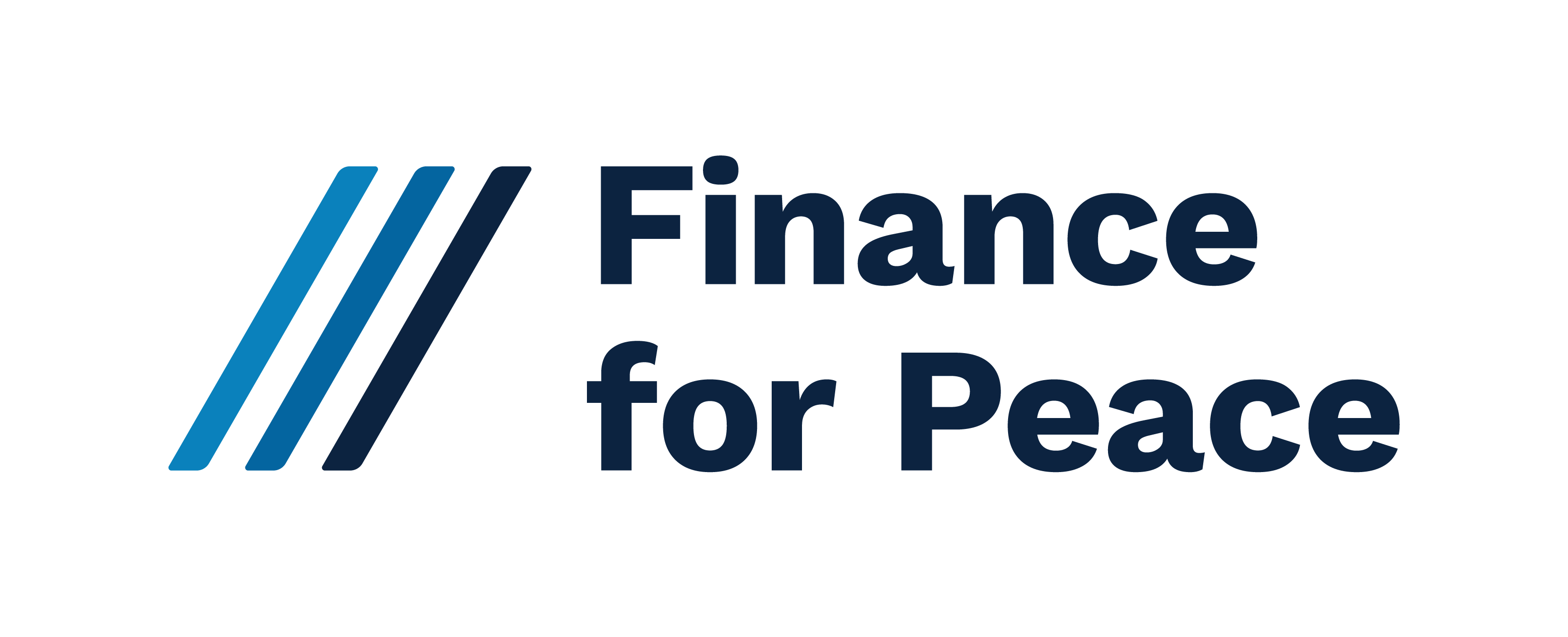Africa Resilience Forum wraps up to key conclusion: “We are transforming development finance”
The Finance for Peace initiative took centre stage at Africa Resilience Forum 2023 in Abidjan, Cote d’Ivoire, the biennial event highlighting financing in fragile contexts and organised by the African Development Bank.
Concluding the milestone event, Finance for Peace hosted two panel discussions, providing the audience a more practical understanding of the currently existing peace-positive finance structures and initiatives. Moving from theory to practice, the final session provided an overview of Mozambique as a case study, and the country where Finance for Peace and the African Development Bank have started their joint Peace Finance research project.
Session 11: Creating the Structures and Environment for Peace-Positive Finance – Finance for Peace Initiative
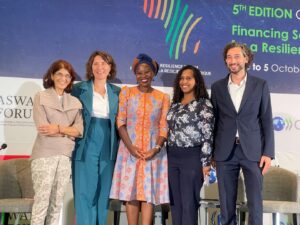
The panel discussion was moderated by incoming Executive Director of Finance for Peace Rosy Khanna (left), with speakers representing different, prominent actors who are furthering peace in fragile and conflict-affected settings through their mandate (from left to right): Ambassador Deike Potzel, Director General for Crisis Prevention, Stabilisation, Peacebuilding and Humanitarian Assistance, Federal Republic of Germany; Dr Roselyn Akombe, Director, Peacebuilding Strategy and Partnership Branch, UN Peacebuilding Support Office; Hanna Mebrahtu, African Union Peace Fund representative; and Frederik Teufel, Lead Coordinator, Transition States Coordination Office, who delivered the concluding remarks of the session.
This session, focusing on innovative models such as the Finance for Peace initiative, brought together actors that have been developing Peace Finance structures and approaches in different contexts. Building on the ‘Innovating Financing for Peace’ event organised in Berlin in 2022, the panel discussion provided an update on how innovative approaches for Peace Finance are being developed, and their next steps.
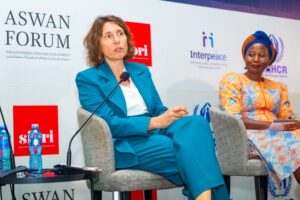
The German Federal Foreign Office (GFFO) funds the Finance for Peace initiative. Representing the GFFO at the three-day forum, Ambassador Deike Potzel said: “I’m thrilled so many actors are now buying into the idea of Peace Finance. I have a feeling we can now get something really going. Everyone knows what green finance is. Now it’s time to focus on blue finance, Peace Finance.”
She added: We need to talk more about the political will to change conflict dynamics. You need good governance and rule of law in order to facilitate livelihoods and make development possible. Peace-positive investment is one pillar of the solution, of what needs to be done, Ambassador Potzel said. “Partnerships are crucial, we need you all on this. We need Peace Finance Champions.”
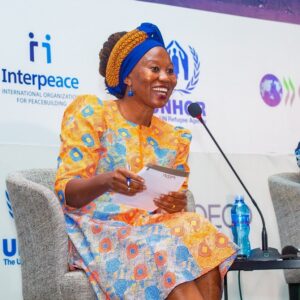
Adding the voice of the UN Peacebuilding Support Office to the call for innovative solutions, Dr Roselyn Akombe said: Ownership of the African continents is important because solutions that come from the outside do not meet our needs.
She mentioned the importance of measurable progress and results, and highlighted the conservation efforts of Burundi’s Kibira National Park through social cohesion is an example of how blended financing can support peace.
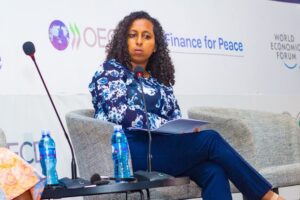
Representing the African Union Secretariat’s new Peace Fund, Hanna Mabrahtu noted: “The money that government spends in conflicts can be allocated to other areas. To education for example…there needs to be a redirection of the resources.” She added: “Sustainable and predictable financing has been the main challenge in financing peace. The African Union’s Peace Fund makes funding available at the early stages of conflict.”
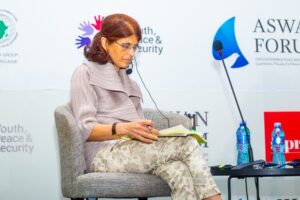
Finance for Peace initiative’s Rosy Khanna summarised the session: “The potential is enormous and there is a lot of opportunity. But it will take time. There are no straight roads in development. The road is bumpy but at the end there is success.”
“Standard setting is important, and I am proud to say that Finance for Peace has developed a Peace Finance Impact Framework to avoid peace washing.”
“The fragility lens, the peace lens, has to become part of the language of development and part of the language for development finance. I would like to thank the AfDB for coming along with us on this journey. This forum has embraced it in a very powerful way.”
Frederik Teufel of the AfDB concluded: “This is a beginning of a journey. When we work with a peace institution, we realise we’re serving the same people.”
“Official development assistance is not sufficient to solve the problems. We need to tap into the capital markets. We need to have the standards for peace-positive investments in place. Mozambique has a lot of potential for this, as we will hear during the next session.”
“We are transforming development finance. We see the willingness of all these actors to do something new. Setting ourselves clear goals, we are very excited to work with all of you, our partners on this journey.”
More information:
Ambassador Potzel’s video from the forum: https://x.com/AA_stabilisiert/status/1709992026043781374?s=20
